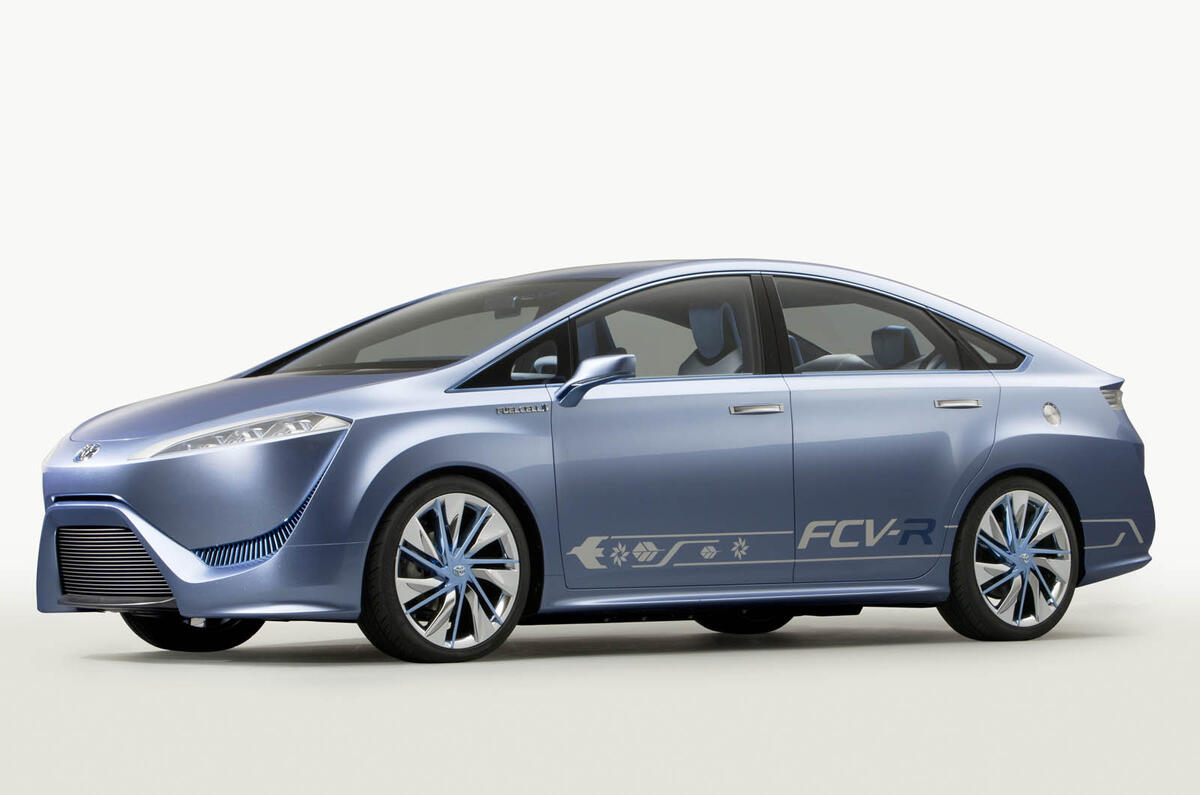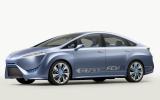Toyota has reiterated that its commitment to fuel cell technology is on course to deliver a hydrogen-powered production vehicle in 2015.
The new car, which is likely to be an Avensis-sized saloon, will be previewed by a concept that is due to be unveiled at the Tokyo motor show in November.
That concept – described by Toyota top brass as a “well-defined mid-size four-door saloon” – is expected to follow the themes laid down by the FCV-R fuel cell concept shown at the Tokyo show in 2011.
Several leading manufacturers including Hyundai, BMW and Honda have been working on hydrogen-powered fuel cell technology for many years, but it has been slow to reach market because issues such as cost, unwieldy technical packaging and the lack of a hydrogen fuelling infrastructure have to be resolved.
However, the technology is extremely attractive to manufacturers because it can, in theory, provide an electric vehicle that can match the driving range of ICE-powered cars, but produces no CO2, NOx or other harmful particulates.
Toyota is developing its Fuel Cell Hydrogen Vehicle, or FCHV, to use a modified version of the Hybrid Synergy Drive system found in its full hybrid models such as the Toyota Prius. The petrol engine is replaced with a fuel cell, and the conventional fuel tank makes way for high-pressure hydrogen tanks.
The FCHV uses the same electrical components as a full hybrid powertrain, as well as a 21kW battery to store energy recovered by its regenerative braking system.
One major practical challenge has been reducing the size of the fuel cell stack by increasing its power density. Toyota says that it has now produced a fuel cell with a power density of 3kw per litre, which it claims is the “world’s best”.
The latest development of the fuel cell is about half the size and weight of the system Toyota fitted to its FCHV-adv prototype in 2008. The new unit also has a greater operating range, with the use of new materials in its construction making cold start possible at temperatures as low as -30°C.
The Japanese company’s fuel cell vehicle was initially envisaged with four hydrogen fuel tanks, but the improvement in energy efficiency has meant this has been reduced to two. The twin fuel tanks and the fuel cell stack are located beneath the vehicle floor, so there is no compromise on cabin and load space compared to equivalent ICE-powered vehicles.
Toyota’s managing officer, Satoshi Ogiso, said the company was committed to tackling the challenges associated with hydrogen fuel cells: “Delivering zero emissions, along with a driving range and refueling time on a par with conventional vehicles, hydrogen will be in our future for a long time.
“There are two final issues to overcome. One is production cost. At this moment, fuel cell vehicle cost is extremely high. Right now we are working hard to reduce the mass production costs and one of our strong points is we try to develop core components such as the fuel cells and hydrogen tanks. We are doing it by ourselves.
“The other issue is that there is no infrastructure for refueling hydrogen fuel cell vehicles at the moment.”
Even when the first fuel cell vehicles reach market, the issue of cost for the consumer remains a significant barrier to large-scale take-up.
At present, Toyota envisages that a hydrogen fuel cell production car would sell for about £70,000. However, the manufacturer says it is committed to making its fuel cell car “affordable”, and further development should lead to a reduction of this figure by the time the first vehicle is ready for market in Europe, Japan and the USA.
Toyota has already produced 100 experimental hydrogen production vehicles based on its Highlander SUV. It leased these vehicles to interested parties in the USA and Japan, although Ogiso revealed that the true cost of each of vehicle was in the region of $1million.
Toyota will showcase the progress it has made with hydrogen fuel cell technology at next month’s Frankfurt motor show.







Add your comment